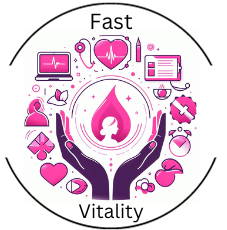Ignite your morning routine with intermittent fasting! Starting your day with this way of eating, like the 16:8 method, dedicates 16 hours to fasting, potentially unlocking a treasure trove of benefits. Research suggests it may aid weight management by burning fat stores and improve blood sugar control. Feeling sluggish? Studies show that you can have better focus and mental clarity, fueling your day with renewed energy. But remember, it’s not just about skipping breakfast! During your eating window, make nutrient-rich choices for optimal results. While generally safe, consulting your doctor before embarking on this journey, especially with pre-existing health conditions, is crucial. So, consider fueling your day with the power of intermittent fasting and experience the potential benefits for yourself!
I’m going to set the stage: Imagine greeting the day not with a rushed bite but with a purposeful pause. Intermittent fasting isn’t a fad; it’s a practice with ancient roots and modern science on its side. You’re going to find out about a lifestyle choice that millions are embracing for its simplicity and health benefits.
This isn’t just about skipping breakfast; it’s also about resetting your body’s clock. It’s an eating pattern where you cycle between periods of eating and fasting. In my opinion, it’s a powerful way to tap into your body’s natural rhythms and heal from the inside out. Today, I’m going to be talking about the various reasons starting your day with intermittent fasting can revitalize your well-being, from weight control to enhanced mental clarity.
Don’t worry too much about the intricacies just yet. You can always adjust your approach down the road. The focus here is on the flexibility and adaptability of intermittent fasting to fit your lifestyle. Choose something that resonates with you, whether it’s the 16/8 method, where you fast for 16 hours and eat during an 8-hour window, or another pattern that works for your daily routine.
That’s the strategy I like to leverage because it can lead to remarkable health transformations. Not only can intermittent fasting help shed excess weight, but it can also improve metabolic health, reduce inflammation, and even extend lifespan. Pretty wild, right? Well, as we dive deeper into the benefits, the connection between intermittent fasting and your body’s internal clock becomes crystal clear.
Synchronizing Body Clocks: How Fasting Aligns with Circadian Rhythms
You’re going to find out how integral our circadian rhythms are to maintaining optimal health. These internal clocks govern the ebb and flow of countless bodily processes, including sleep, metabolism, and even hormone production.
Intermittent fasting does more than just limit your eating window; it can actually sync up with your body’s natural rhythms to enhance overall well-being. By Cha your eating patterns with the times when your body is primed for digestion and metabolism, you optimize the function of your internal systems.
Now, science backs up the benefits of this synchronization. Several studies have highlighted that adhering to an eating schedule that complements our circadian rhythms can lead to better metabolic health, improved sleep quality, and even increased longevity.
That’s not all – there’s also evidence suggesting that when you align your meal timings with daylight hours, you can give your body an easier time managing blood sugar levels and maintaining a healthy weight.
Igniting the Metabolic Switch: The Science of Enhanced Fat Burning
You’re going to find out about how intermittent fasting flips a switch in your metabolism, which can be quite a game changer for anyone looking to shed some pounds or improve metabolic health.
Normally, your body relies on glucose, which comes from carbs, as its primary fuel source. When you fast, your glucose reserves run low, and your body begins to break down fat for energy; it’s like lighting a new kind of fuel to keep the fire burning. This metabolic shift is called ‘ketosis’, and it leads to increased fat burning. That’s where the magic happens for weight loss.
In my opinion, the fasting window is critical here. It provides your body with the necessary time to use up glucose stores and move onto burning fat. Consistency in this fasting window leads to better results. Imagine you’re training your metabolism to become more efficient, flexible, and geared toward using fat for fuel.
Now, don’t worry too much about jumping straight into long fasts. You can always adjust your approach down the road. Start with a shorter fasting window and listen to how your body responds. Eventually, you’ll find that sweet spot where your body begins to tap into fat reserves more readily for a boost in energy and overall health.
Mental Clarity and Focus: The Cognitive Perks of Skipping Breakfast
Now, this isn’t just about trimming your waistline; it’s also about sharpening your mind. Many people are skeptical about missing their morning meal, but research shows potential cognitive benefits tied to intermittent fasting.
When the body shifts into a fasting state, it eventually runs low on its usual energy source, glucose. This triggers your liver to produce ketones, which your brain can use as an alternative fuel, and this process is known as ketogenesis. This is where the magic happens for your cognitive functioning.
Ketones are like high-octane brain fuel. Several studies suggest that when your brain starts to utilize ketones for energy, you may experience heightened focus and mental clarity. Some fasting aficionados even report a sense of being more ‘switched on’ throughout the day.
This cognitive boost isn’t just short term. In fact, intermittent fasting has shown promise in protecting against neurodegenerative diseases, like Alzheimer’s and Parkinson’s. So, skipping breakfast might actually keep your brain running smoothly well into your golden years.
But mental perks are just part of the puzzle. Come to think of it, intermittent fasting also encourages a more mindful approach to eating, which we’re going to get into next. It teaches us not only when to eat but to be more attuned to the quality of what we eat.
Cultivating Discipline and Mindful Eating Habits
If you want to revolutionize the way you think about food, intermittent fasting can be a game-changer. This isn’t just about shedding a few pounds; it’s also about gaining a profound understanding of your eating cues and patterns.
You’re going to find out about how fasting can elevate your self-awareness about hunger and satiety. This practice often leads to a natural reduction in calorie intake, not because of strict dieting, but due to an increased sensitivity to your body’s actual needs.
By restricting your eating to a specific window of time, you naturally become more selective about what you consume. It encourages you to plan and appreciate your meals, instead of eating out of boredom or stress.
What’s more, you’ll likely notice a trend towards healthier choices, as you’ll want to optimize the nutrition you get from your meals within the eating window. This approach can potentially decrease the propensity for mindless snacking, which often leads to weight gain and health issues.
Remember, the goal here is to create a sustainable eating pattern. You can always adjust your approach down the road, but starting with a clear structure can help you establish a solid foundation for mindful eating.
Physical Endurance and Recovery:
Now, let’s talk about how starting your day with intermittent fasting can be a game-changer for athletes. Fasting isn’t just about weight management, it also presents significant benefits for those looking to enhance their athletic performance.
You might wonder how not eating could possibly help with athletic endeavors. Well, it’s all about energy efficiency and the body’s adaptive responses to fasting. During fasting periods, the body learns to utilize its fat stores more effectively for energy, which can be particularly beneficial for endurance sports. It’s a bit like training your body to run on a more persistent and abundant fuel source.
Several studies have shown that athletes who put fasting into their routine may experience improved muscle recovery. This is due in part to the increased human growth hormone production during fasting states, which aids in tissue repair and muscle growth. Yes, you heard that right, fasting could actually help muscles recover faster after intense workouts.
There’s also the aspect of improved insulin sensitivity from intermittent fasting. Better insulin regulation can mean more stable energy levels throughout the day, which translates to consistent performance in training and competitions. No more sugar highs and crashes—it’s steady energy for the long haul.
But don’t just take my word for it, let’s look at some evidence. One study published in the ‘Journal of Translational Medicine’ found that athletes who fasted overnight and performed aerobic training showed a greater increase in VO2 max and muscle glycogen concentration. This means their bodies became more efficient at utilizing oxygen and they had more energy reserves in their muscles—two critical factors for athletic success.
Of course, as with anything, it’s crucial to tailor fasting practices to your individual schedule, needs, and training demands. Consultation with nutritionists and health professionals is highly advisable to ensure a safe and effective fasting routine.
Longevity and Disease Prevention: A Peek into Your Future Health
Intermittent fasting isn’t just about looking good or improving your marathon time; it’s also about investing in your future health. This practice has been linked to enhanced cellular repair processes. In my opinion, that’s like giving your body a mini-overhaul every time you fast.
Here’s the kicker: there’s evidence suggesting intermittent fasting can help reduce the risk of chronic diseases. Imagine a lifestyle change that could potentially dial down your chances of developing conditions like type 2 diabetes, heart disease, and certain types of cancer. That’s powerful.
The science behind this means something known as autophagy – the body’s way of cleaning out damaged cells to regenerate newer, healthier ones. Think of it as your internal recycling program that’s kicked into high gear when you fast.
And let’s not forget about inflammation. Chronic inflammation is a known troublemaker, playing a role in countless diseases. Intermittent fasting can lower inflammation, thus building a stronger shield against these ailments.
Finally, we can’t overlook the impact on longevity. Sure, we’re all looking for ways to add more years to our life, but how about adding more life to our years? Intermittent fasting shows promise here by potentially influencing our genes and enhancing our overall quality of life.
Starting the Fasting Journey: Tips for Success and Potential Challenges
You’re going to find out that starting intermittent fasting can be both exciting and a bit intimidating. I’m here to help you make this transition as smooth as possible.
First things first, choose something that resonates with you. There are various intermittent fasting methods, like the 16/8 or the 5:2 approach, so pick the one that fits your lifestyle best.
Don’t worry too much about feeling hungry or deprived early on. This is normal, and your body will typically adjust after a short period. Stay hydrated and keep your mind occupied, and these feelings will pass more swiftly than you expect.
A common challenge is social eating. If you’ve got a dinner with friends, try scheduling your fasting window to accommodate it. Flexibility can be key when you’re aligning fasting with your social life.
Remember, you can always adjust your approach down the road. If one fasting schedule isn’t working, don’t be afraid to try another. Your first attempt doesn’t need to be your last.
Just don’t focus too much on perfection. Some days won’t go as planned, and that’s okay. What’s important is the overall consistency, not the occasional misstep.
I really hope that you experience the numerous benefits that intermittent fasting can offer. As you embark on this journey, be patient with yourself, educate yourself and listen to your body’s cues.
If you want to share your experiences or have questions as you go along, I’d love to hear from you. Leave your comments below or reach out to me – I’m here to support your health and wellness journey.

I stumbled upon this article while researching the benefits of intermittent fasting, and I must say, it’s been an insightful read! The detailed information about starting the day with intermittent fasting caught my attention. The benefits mentioned align perfectly with what I’ve been hearing about this approach to nutrition and fat loss. It’s always reassuring to come across well-researched content that not only educates but also motivates. Thanks for sharing these valuable insights